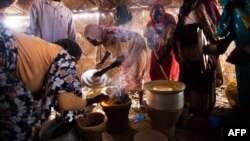Nigeria’s government announced last year it would start giving out clean cook stoves to women in rural communities to cut down on the use of harmful wood stoves. Months later, however, a watchdog group is calling the program nontransparent.
Last November, Nigeria’s government announced it would spend about $46 million, to get 750,000 clean cook stoves and 18,000 insulated cook bags - called Wonderbags - into the hands of rural women.
Diseases associated with inhaling smoke disproportionately affect women who spend time cooking over wood fires. About 100,000 people die yearly from inhaling wood smoke, Nigeria’s third biggest killer after malaria and AIDS.
No sign of money, cook stoves
Now, anti-corruption group Follow the Money says the Ministry of Environment is not answering basic question about how it is using money allocated for the program. Nor has the program delivered on its promise to give women cook stoves.
The ministry is threatening to cancel the contract, which would raise new questions about money already spent on the program.
Hamzat Lawal, the co-founder of Follow the Money, said, "We want to see a transparent and accountable process whereby this would now engage different stakeholders and build public confidence around it.”
Allegations of public corruption and misplaced money are common in Nigeria. New President Muhammadu Buhari successfully built an image of being tough on corruption to triumph in the March election.
Lawal said there is no evidence of money being stolen, but he questions why the Ministry of Environment refuses to make public the contract with the cook stove supplier or how it chose the supplier.
“How did this contractor emerge to manage this huge process in purchasing 750,000 clean cook stoves and Wonderbags?” asked Lawal.
Lack of accountability
Cook stove supplier Renewable Energy Services Limited did not respond to inquiries, and a spokesman for the Ministry of Environment declined to be interviewed.
But in a public address, the ministry permanent secretary said the supplier was chosen for its relationship with a German stove manufacturer and the ministry might revoke the contract since it had not received all the promised stoves.
If the contract is canceled, Lawal said the money already is spent, and funds allocated to the ministry from a government account needs to be accounted for.
“If you are going to go ahead to cancel it, what happens to the $6.5 million [1.3 billion NGN] that you have paid the contractor? What also happens to the $18 million [3.7 million NGN] in your account, and also the $21million [4.2 billion NGN] in the account of the ecological fund?” Lawal asked.
Answers to those questions could be expected to come from whomever becomes the new minister of environment. Buhari has yet to announce his Cabinet nominees.




